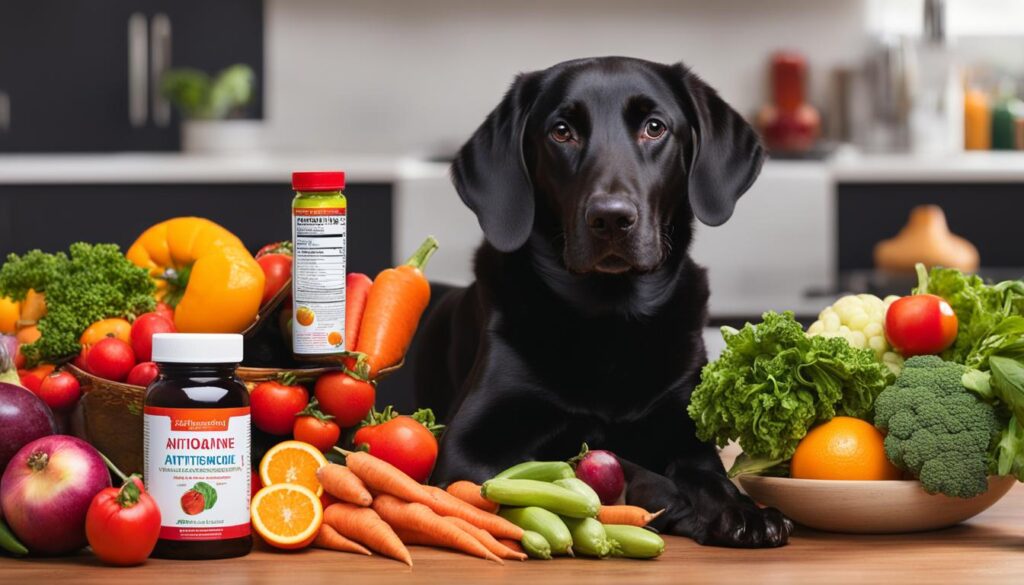Welcome to our article on antioxidants and their crucial role in maintaining the health of your beloved furry friend. Just like in humans, antioxidants play a vital role in countering the effects of damaging free radicals in a dog’s body. In this section, we will delve into the importance of antioxidants in dog diets, their benefits for aging dogs, the role they play in maintaining a dog’s skin health, and the antioxidant-rich foods that can contribute to your dog’s overall well-being.
When dogs are sick, elderly, exposed to toxins, or have poor nutrition, their bodies produce an increased number of free radicals. These harmful molecules can wreak havoc on a dog’s health, leading to various issues and degenerative diseases. Antioxidants help break the cycle of cellular damage by donating electrons to free radicals without becoming free radicals themselves. This process is essential for a strong immune system and healthy aging in dogs.
Studies have shown that an antioxidant-enriched diet can have numerous benefits for dogs. Not only does it improve brain function in older dogs, but it also reduces age-related behavioral changes, promotes immune system activity, and helps with common skin problems. By incorporating antioxidant-rich foods into your dog’s diet, you can give them the support they need to thrive and live a long, healthy life.
Key Takeaways:
- The role of antioxidants in dog diets is crucial for maintaining their overall health.
- Aging dogs can benefit from an antioxidant-rich diet, as it improves brain function and reduces age-related behavioral changes.
- Antioxidants play a significant role in maintaining a dog’s skin health and combating common skin problems.
- Including antioxidant-rich foods in your dog’s diet can promote a stronger immune system and healthier aging.
- Consult with a veterinarian to ensure your dog’s diet provides an adequate amount of antioxidants for optimal health.
The Importance of Antioxidants for Dogs
Antioxidants are essential for dogs because they protect against damage caused by free radicals and other reactive oxygen species. They play a vital role in maintaining your furry friend’s overall health and well-being. By incorporating natural antioxidant sources into your dog’s diet, you can provide them with numerous benefits.
Benefits of Antioxidants in Canine Diet
Antioxidants offer a wide range of advantages when included in a dog’s diet. They improve cognitive function, helping to keep your dog sharp and mentally alert. Antioxidants also boost the immune system, enhancing your dog’s ability to fight off infections and diseases. Additionally, they promote healthy skin and coat, reducing the risk of allergies and skin problems. Antioxidants are also known to support joint health, promoting mobility and reducing the risk of arthritis symptoms. Furthermore, they contribute to overall eye health and can help maintain a healthy heart.
Natural Antioxidant Sources for Dogs
There are numerous natural sources of antioxidants that you can incorporate into your dog’s diet to provide them with these beneficial compounds. Fruits such as blueberries, strawberries, and apples are rich in antioxidants and make tasty treats for your furry friend. Vegetables like spinach, kale, and carrots are also excellent sources. Additionally, ingredients like turmeric, green tea, and fish oil contain antioxidant properties. By including these natural sources in your dog’s meals, you can boost their antioxidant intake and support their overall health.
| Antioxidant Source | Benefits |
|---|---|
| Blueberries | Rich in vitamins and antioxidants that support brain health and improve cognitive function. |
| Spinach | Packed with antioxidants that promote healthy eyes and provide immune support. |
| Turmeric | Contains curcumin, a powerful antioxidant that has anti-inflammatory properties. |
| Fish Oil | High in omega-3 fatty acids, which have antioxidant and anti-inflammatory effects. |
By choosing high-quality dog food that contains these natural antioxidant sources, you can ensure that your dog receives a balanced diet that supports their overall health and well-being. Remember to consult with your veterinarian to determine the appropriate amount of antioxidants for your dog’s specific needs and to ensure that any supplements or additional dietary changes are safe and appropriate.

Sources of Antioxidants for Your Dog and Cat
When it comes to providing antioxidants for your furry friends, a complete and balanced diet is key. Natural sources of antioxidants can be found in high-quality pet foods that contain ingredients like fruits, vegetables, and other antioxidant-rich foods. These ingredients provide essential vitamins and minerals that help combat free radicals and support overall health.
Here are some examples of antioxidant-rich foods that can be incorporated into your pet’s diet:
- Blueberries: These small but powerful berries are packed with antioxidants, vitamins, and fiber.
- Carrots: Carrots are not only a great source of antioxidants, but they also promote healthy teeth and gums.
- Spinach: This leafy green vegetable is loaded with antioxidants, iron, and other nutrients that support immune health.
- Sweet Potatoes: Rich in beta-carotene, sweet potatoes are a tasty and nutritious addition to your pet’s diet.
While a balanced diet should provide sufficient antioxidants for your pet, supplements can also be considered to boost their antioxidant intake. However, it is important to consult with a veterinarian or veterinary nutritionist to determine the right dosage and ensure that the supplements are made from natural ingredients.
Antioxidant Supplements for Dogs
There are various antioxidant supplements available for dogs that can help support their overall health. Some popular options include:
- Coenzyme Q10: This antioxidant supports heart health and enhances energy production in cells.
- Skin and coat soft chews: These treats contain antioxidants such as fish oil and vitamin E, which promote healthy skin and a shiny coat.
- Krill oil: Rich in omega-3 fatty acids and antioxidants, krill oil can help reduce inflammation and support joint health.
Remember, before introducing any supplements to your pet’s diet, it is important to consult with a veterinarian. They can provide guidance on the right dosage and ensure that the supplements are safe and suitable for your dog.

In conclusion, providing your dog or cat with a diet rich in antioxidants is essential for their overall health and well-being. Natural sources of antioxidants, such as fruits, vegetables, and other antioxidant-rich foods, should be the primary focus. However, supplements can also be considered with the guidance of a veterinarian. By incorporating antioxidants into your pet’s diet, you can help support their immune system, promote healthy aging, and ensure they live a long and vibrant life.
Antioxidant Supplements for Dogs
If you’re looking to boost your dog’s antioxidant intake, consider incorporating antioxidant supplements into their diet. These supplements are rich in antioxidants and can provide additional benefits to support your dog’s overall health and well-being. However, it’s crucial to choose supplements made from natural ingredients and consult with your veterinarian to determine the right dosage and avoid potential toxicity or over-supplementation.
Some popular antioxidant supplements for dogs include:
- Coenzyme Q10: This powerful antioxidant plays a key role in cellular energy production and can help support heart health and immune function in dogs.
- Skin and Coat Soft Chews: These tasty treats are packed with antioxidants like vitamins A and E, which can promote healthy skin and a shiny coat.
- Krill Oil: Krill oil is a rich source of omega-3 fatty acids and antioxidants, which can benefit joint health, cognitive function, and immune response in dogs.
When choosing antioxidant supplements for your dog, it’s important to prioritize quality and efficacy. Avoid purchasing supplements over the counter and instead follow your veterinarian’s recommendations. They can provide guidance on which supplements are best suited for your dog’s specific needs and health conditions.

Table: Comparison of Antioxidant Supplements for Dogs
| Supplement | Main Antioxidant | Benefits |
|---|---|---|
| Coenzyme Q10 | Coenzyme Q10 | Supports heart health and immune function |
| Skin and Coat Soft Chews | Vitamins A and E | Promotes healthy skin and a shiny coat |
| Krill Oil | Omega-3 fatty acids and antioxidants | Benefits joint health, cognitive function, and immune response |
By incorporating antioxidant supplements into your dog’s diet, you can provide them with an extra boost of essential nutrients and antioxidants to support their overall health and vitality.
Conclusion
As you can see, incorporating antioxidants into your dog’s diet is essential for their overall health and well-being. These powerful compounds play a crucial role in counteracting the damaging effects of free radicals, which can have a negative impact on your dog’s aging process and immune system.
By including antioxidant-rich foods in your dog’s diet, such as fruits and vegetables, you can provide them with the necessary nutrients to support their optimal health. These natural sources of antioxidants can help improve cognitive function, boost immune response, and promote healthier joints, eyes, and heart.
In addition to natural food sources, you may also consider incorporating antioxidant supplements into your dog’s routine. However, it’s important to consult with your veterinarian to determine the right dosage and ensure that the supplements are made from natural ingredients. Taking these precautions will help avoid any potential toxicity or over-supplementation.
So, whether you choose to provide antioxidants through their diet or with the help of supplements, adding these vital compounds to your dog’s routine can greatly improve their quality of life. Give your furry friend the support they need and ensure a long and healthy life by including antioxidants in their daily regimen.
FAQ
What are antioxidants and why are they important for dogs?
Antioxidants are substances that counteract the damaging effects of free radicals in the body. They are important for dogs because they promote a strong immune system, healthy aging, and protect against various health issues.
How do antioxidants benefit dogs?
Antioxidants improve cognitive function, resistance to allergies and skin problems, immune response, joint health, eye health, and heart health in dogs.
Where can dogs get antioxidants from?
Dogs can get antioxidants from a complete and balanced diet made from high-quality ingredients, such as fruits, vegetables, and natural antioxidants. Supplements can also be used to boost the antioxidant content of their diet.
What types of antioxidants are found naturally in pet foods?
Pet foods naturally contain antioxidants like Vitamin E, Vitamin C, Vitamin A, carotenoids, and selenium.
Should I consider giving my dog antioxidant supplements?
Supplementing with antioxidant-rich supplements can be beneficial for dogs, but it is important to consult with a veterinarian to determine the right dosage and ensure the supplements are made from natural ingredients.
Can I purchase antioxidant supplements over the counter?
It is advised to avoid purchasing supplements over the counter and to follow your vet’s recommendations to ensure the safety and appropriate dosage for your dog.





